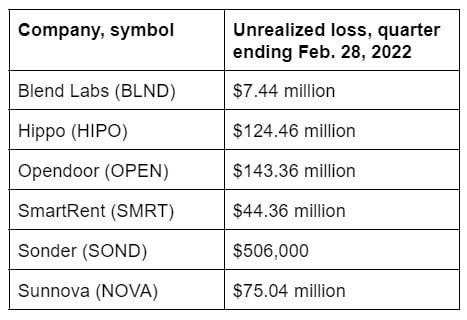Homebuilder Lennar Corp. plans to spin off its LENx investment division later this year in order to become a “pure-play homebuilding company,” citing volatility in the valuations of the publicly-traded companies it holds a stake in, including real estate tech startups Opendoor, Blend Labs and Sonder.
In its latest quarterly earnings report, Lennar on Wednesday recognized $395 million in paper losses during the quarter ending Feb. 28 from its investments in six publicly traded tech companies.
In addition to reigning iBuyer champion Opendoor and cloud banking software developer Blend Labs, LENx reported unrealized losses on its investments in short-term rental manager Sonder, home insurance startup Hippo, solar and energy service provider Sunnova, and self-guided tour provider SmartRent. Although LENx is also a major stakeholder in Doma, a publicly traded digital title, escrow and closing provider, it uses a different accounting method to estimate its value.
Lennar Corp. unrealized losses from technology investments

Source: Lennar Corp. earnings report for quarter ending Feb. 28, 2022.
Through LENx, Lennar has invested in a portfolio of two dozen companies, focusing on three “core verticals” — multifamily, single-family for rent, and land strategies. Most of the companies LENx has a stake in, including Divvy Homes and Notarize, have yet to go public.
On a call with investment analysts, Lennar Executive Chairman Stuart Miller said the homebuilder still likes the companies LENx has invested in, which “are working to reshape various parts of our company and our industry,” and helping Lennar cut costs.
“We have made significant strategic investments in various new technology companies that are working to reshape various parts of our company and our industry,” Miller said. “Some are disruptors and some are enhancers. All of them are core to the future of, as well as the presence of our core operating platform.”
But Miller said Lennar is working with regulators to spin LENx off as an independent entity because when companies it’s invested in go public, they create volatility in the homebuilder’s earnings results that “causes some confusion on both the upside and the downside.”
Miller noted that in the first quarter of 2021, Lennar reported $470 million in paper gains on the technology companies it’s invested in.
“These are non-monetary and non-operational profits and losses, and they really do not reflect the state of the housing market, or the operating performance of the company within that market,” Miller said.
That said, Lennar chooses “not to sell the ownership in these companies just because they go public. Instead, we are strategically engaged in the businesses because — in the businesses of these companies and because we are very enthusiastic about the future of these businesses and our LENx strategy.”
Spinning LENx off as a separate company, which Lennar refers to as “SpinCo” for now, will allow Lennar to focus on “becoming a pure-play homebuilding company,” Miller said.
Miller said Lennar has filed a confidential Form 10 registration statement with the Securities and Exchange Commission in February, and received a first round of comments from the SEC, and initiated the process to have SpinCo listed on the New York Stock Exchange.
He said Lennar “can control the timing of the spin,” but that, “given the choppiness of the capital markets and the work that is still being completed, we’re pushing our expectations for the actual execution to the third or fourth quarter of this year.”
Title insurer First American Financial has also been making big bets on next-generation proptech investments, with investments in 16 venture-funded companies including digital title and settlement services provider Endpoint, as well as Lev, Offerpad, Orchard, Pacaso, Ribbon, Side Inc., and Sundae.
Email Matt Carter

.png)

More Stories
Discover the Best Finance Agency for Your Investment Goals
How a Finance Agency Helps You Plan for the Future
The Key to Smart Investing with a Finance Agency